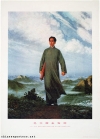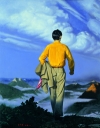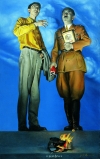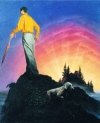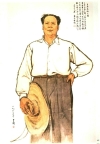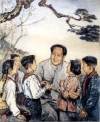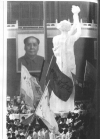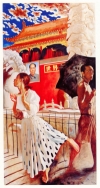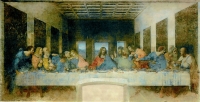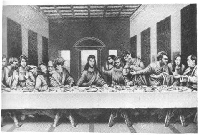Last Banquets
Art works like Liu Liguo’s Laughing Buddhas Mao (2005, ill. 5.59a and ill. 5.59 b) and Zhang Hongtu’s comic interpretation of the “red sun” as the “wrong sun” in his depiction of capitalist Quaker Oats Mao (1987, ill. 5.25) are playful in their negotiations with Mao’s godlike qualities. This can be said, too for Zhang Hongtu’s 1989 work entitled "The Last Banquet" (ill. 5.75a). It is a very close parody of Leonardo da Vinci’s (1452–1519) "The Last Banquet" (1495–98) except that everyone, including Jesus and each one of his disciples, is Mao (ill. 5.75b). It may be possible that this image is in fact the parody of a parody, as the participants in the (European Maoist) 1968 movement, too, had an image like this that included all their idols: Che Guevara and Mao Zedong next to Wolfgang Lefèvre, Rudi Dutschke, Gaston Salvatore, Fritz Teufel, Horst Mahler, Rainer Langhans, Karl-Heinz Roth, Bernd Rabehl, Daniel Cohn-Bendit, Christian Semler, and Hans-Jürgen Krahl (ill. 5.75c).
Zhang’s "Last Banquet" contains a “Christ Mao” in the center and a “Judas Mao” holding the Little Red Book and, in his eagerness, overthrowing his rice bowl on the table. To whom does Zhang’s image speak? Would the Chinese public be aware of the Christian background to the parody? Would they know the positions of God’s son and the traitor? Does Zhang Hongtu play with Mao only because he realizes that Mao is a fad in the United States, where Zhang emigrated in 1982? Can the American public, on the other hand, understand the treason behind the Little Red Book and the overthrown rice bowl (and will they even realize that the surface of the painting is covered in text from the Little Red Book and that the landscapes seen through the windows in the background are Chinese? Are the Great Leap Forward and the famine it caused part of the message of “Judas Mao,” then? Does the Little Red Book in Judas Mao’s hand identify him with Lin Biao (who publicized it) or does it hint at the inefficiency or, even more so, the treachery of Mao Zedong Thought and thus, by implication, Mao himself? Is Mao himself thus made responsible for the two greatest atrocities in modern Chinese history, one associated with the rice bowl (the Great Leap Forward Famine) and the other with the Little Red Book (the Cultural Revolution) after all?
